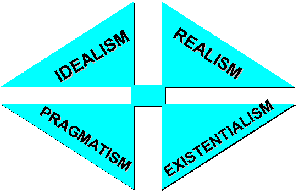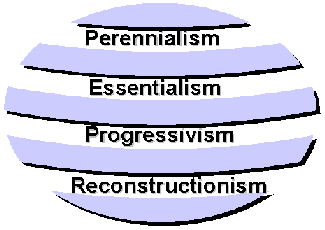|
 |
NOTETAKING GUIDES: PHILOSOPHY
Basic Considerations
- Philosophical assumptions about the nature of the good life pay a significant role in determining how we live and how and what we teach.
Defining Philosophy
- A search for the wisdom of life
- An attempt to understand the universe as a whole
- An examination of our moral responsibility and our social obligations
- An effort to fathom the divine inventions and our place with reference to them
- The way we perceive the world around us
- How we define what is important to us
What is a Philosophy?
- Personal views of the "good life" based on one's own prior knowledge.
What is Philosophy?
- Two important facts about philosophy -
- It is a reflective or meditative activity.
- It has no explicitly designated subject matter of its own but it is a method or type of mental operation that can take any area as its object.
Educational Philosophy
- Ideas, attitudes, and beliefs about epistemology (nature of knowledge), society/culture, the individual, and learning. These foundational elements control the content and organization of the curriculum.
- Our views toward these factors make up our philosophy of education.
Philosophical Considerations
- Most lay people "adopt" a philosophy of life as it were by "osmosis" - from family, school, peer groups, church, and other components of the culture.
- Frequently, this philosophy of life is unexamined and operates at an unconscious level.
As a result, it often is found to contain irrational elements, incomplete ideas, and inconsistent beliefs.
- Implicit and irrational as it may be, our philosophy represents a deeply felt commitment and is a powerful determinant in the decision-making process of every individual as well as of the society as a whole.
How does philosophy influence the curriculum?
- It gives meaning to the decisions and actions of curriculum workers.
- The philosophy of the curriculum worker is reflected in his/her work.
- Their life experiences, common sense, social and economic background, education, and general beliefs about people are brought into and reflected through their work.
- The philosophy advocated or reflected by a particular school or business and its officials influences its goals and content as well as the organization of its curriculum!
John Goodlad on Educational Philosophy
- "Philosophy is the beginning point in curriculum decision making and is the basis for all subsequent decisions regarding curriculum."
- It helps curriculum developers to answer questions such as:
- What subjects are of value,
- How students learn, and
- What methods and materials to use?
- It also provides them with a basis for dealing with precise tasks and for making such decisions as what workbooks, textbooks, or other cognitive and non-cognitive activities to utilize and how to utilize them, what homework to assign and how much of it, how to test students and how to use the test results, and what courses and subject matter to emphasize.
Major Philosophical Views

- Idealism
- Emphasizes moral and spiritual reality as the chief explanation of the world.
Truth and values are seen as absolute, timeless, and universal.
It would teach the liberal arts to everyone (philosophy, literature, history, mathematics, and foreign language).
- Realism
- Stresses logic and lessons that exercise the mind and cultivate rational thoughts.
It would teach the 3Rs, science, and the arts.
- Pragmatism
- Emphasizes that knowledge is a process that is constantly changing.
Knowing is considered a transaction between the learner and the environment.
It would teach problem solving and critical thinking in an active learning environment.
- Existentialism
- Emphasizes individualism and personal self-fulfillment.
A person creates his/her own definition and in so doing makes his/her own meaning of life.
Many critics feel that this philosophy has limited applications to K-12 schooling.
Philosophy becomes the principles for guiding action!
- Do we provide educational programs that -- develop a society or the individual?
- Do we wish to make good citizens and workers? or
- Do we want to make human beings who will live life to their fullest?
Organization of Philosophical Positions
- Ontology - Nature of Reality
- Epistemology - Nature of Knowledge (truth)
- Axiology - Nature of Values (good)
See overhead
Translated Educational Philosophies

- Perennialism
- Rooted in realism
- 3Rs, moral and religious training; Greek, Latin, grammar, logic and geometry; the liberal arts.
- Expounds the past and teaches universally agreed upon knowledge and cherished values of society.
- Teacher is a master of subjects and guides discussion.
- Common curriculum for all students; student interests are irrelevant.
- Essentialism
- Rooted in idealism and realism
- Curriculum should be geared to the fundamentals or essentials.
- 3Rs at elementary level; 5 core subjects at high school.
- Not rooted in the past; concerned with contemporary scene.
- Rejects electives for their costs.
- Parallels today's secondary schools with academics and cognitive skills + computers.
- Progressivism
- Rooted in pragmatism
- Reform social and political order in society (early 20th century).
- How to think; not what to think.
- Teach problem solving, inquiry, cooperation and self-discipline.
- Teach through activities, experiments, problem solving, projects and thematic approaches.
- Reconstructionism
- Rooted in existentialism
- Emphasizes society-centered education; appropriate for a society in crisis - some believe our society and international society today.
- Curriculum emphasizes cultural pluralism, equality, and futurism.
- Look at global issues and the larger social order.
- Study empirical analysis and scientific approaches plus social, political and economic ideology.
Philosophies - Their beliefs and translation into education
- Realism Tradition Perennialism
- Idealism Conservative Essentialism
- Pragmatism Contemporary Progressivism
- Existentialism Liberal Reconstructionism
A Summary
- Philosophy gives meaning to our decisions and actions.
- We should recognize the pervasiveness of philosophy in determining our views of reality, what values and knowledge are worthwhile, and decisions in education in general and curriculum development in particular.
- No single philosophy, old or new, should serve as the exclusive guide for making decisions about education or the curriculum.
- What we need is a prudent education philosophy; one that is politically and economically feasible and serves the needs of the students, company and society.
- The kind of society or company into which we evolve is in part reflected in our educational/ training systems which is influenced by the philosophies adhered to by their leaders.
- Leaders need to scrutinize their curriculum in regard to their mission and philosophy.
Closing Thoughts
- Why do curriculum workers/trainers need to provide assistance in developing and designing instructional practices that coincide with their organization's vision?
- What do the major philosophical beliefs say about occupational-technical education, i.e., science, technology, and computers?
- How do the philosophies of state leaders, CEOs, and school leaders effect curriculum design?

|
 |